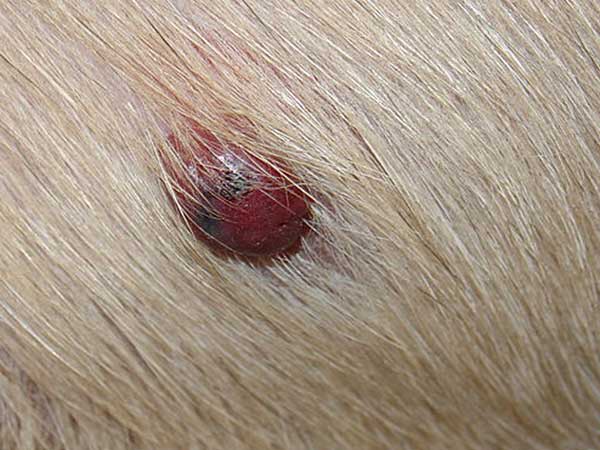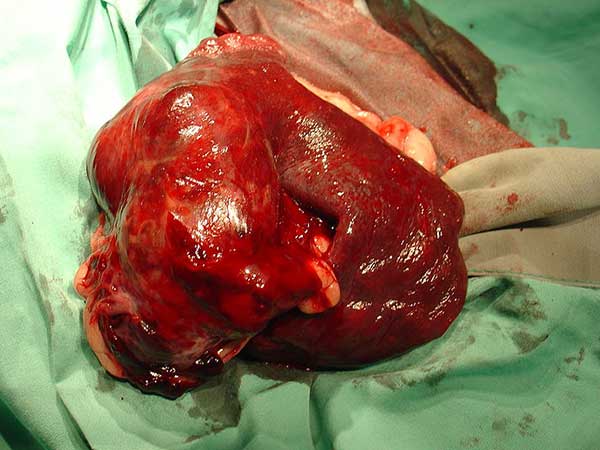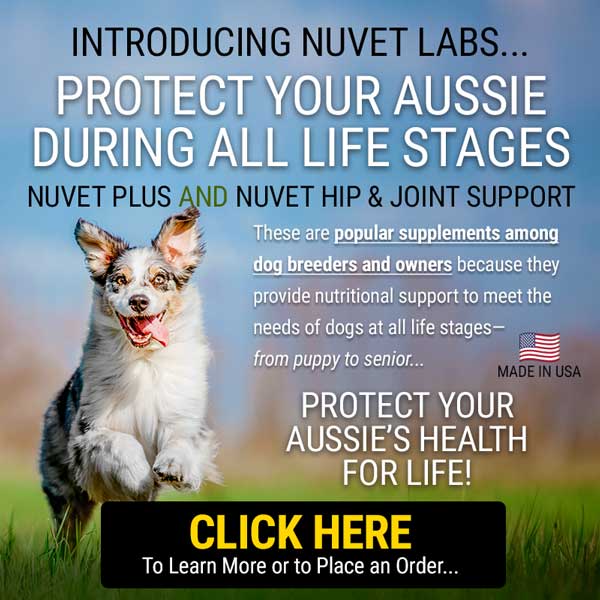
How Does Hemangiosarcoma In Dogs Affect Your Australian Shepherd?
WARNING:
Graphic images of skin lesion and surgical precedure on hemangiosarcoma of the spleen below.
Hemangiosarcoma is a deadly form of cancer that is most common in dogs, though it may also affect other kinds of animals as well.
It can occur in three forms: dermal (on the skin), hypodermal (under the skin) or visceral (on the spleen, pericardium or heart), but tumors of the spleen and liver generally make up more than half of all recorded cases. Since it strikes these vital organs, it unfortunately has a very limited survival rate.
The tumors involved in this type of cancer, which initiate in the cells that line the blood vessels, are almost always malignant and extremely metastatic, which means they have a tendency to spread quickly.
Because they occur in the blood cells, they can move rapidly through the body via the bloodstream, and can affect a number of organs including the liver, spleen and heart. Treatment will depend on the location of the tumor and the organs involved but even in the best cases the prognosis is not good.

DenisNata / stock.adobe.com
Sadly, the prognosis for dogs diagnosed with hemangiosarcoma is not good.
Again, because hemangiosarcoma originates in the blood cells, the tumors fill with blood and this can lead to rupture and acute hemorrhage. Unfortunately, in many cases a dog will show very few symptoms prior to this, which is why these ruptures often lead to collapse and death. While the effects are well documented, the cause of this acute form of cancer is unknown.
While some breeds, such as the German Shepherd, Boxer, Great Dane, Golden Retriever and Pointer, are more susceptible to this form of cancer it may occur in any breed, including the Australian Shepherd. It is most common among older dogs, between the ages of 8 and 10, but it has also been known to occur in young dogs. It also seems to affect males much more frequently than females.

This work is licensed under the Creative Commons Attribution-ShareAlike 3.0 License. Original file. Created by User:Joelmills, This version is cropped 600x450.
Hemangiosarcoma of the skin. The tumor is about one centimeter in width.
Symptoms Of Hemangiosarcoma In Dogs
The symptoms of hemangiosarcoma will depend on which organ or organs are affected. Tumors that affect the spleen will impair spleen function, while those that affect the liver will cause impaired liver function. Other common symptoms can include weight loss, weakness, lameness, collapse, seizures, dementia, abdominal swelling, and acute blood loss.
If your dog displays any of these symptoms you should get him to the vet as quickly as possible for a thorough exam and diagnosis. Your vet will likely use a variety of techniques including blood analysis and diagnostic imaging to determine the presence, location, and severity of the tumor. Once he has a complete picture of the problem, he will then be able to make recommendations for treatment.

This work is licensed under the Creative Commons Attribution-ShareAlike 3.0 License. Original file. Created by User:Joelmills, This version is cropped 600x450.
Hemangiosarcoma of the spleen in a dog. The tumor is on the left, and normal spleen is on the right.
In general, treatment for hemangiosarcoma involves surgical removal of the tumor and may also require removal of the diseased organ. In some cases, chemotherapy and/or radiation may also be recommended, but even with these steps the rate of survival is very, very low. Most dogs live less than a year from the time of diagnosis.
Removal of the diseased organ may increase survival for a short of amount of time, but only by months. If your dog does undergo surgery you'll need to provide some extra care during the recovery period, mostly by giving him a quiet, stress free environment to help promote healing.
No one likes to see his or her pet suffer, but unfortunately with so little still known about this common and aggressive form of cancer it is almost impossible to avoid it. If you and your pet are faced with this diagnosis, your vet can advise you as to the best steps to take to limit pain and make his final days as comfortable as possible.
For more information about Aussie health issues see the Australian Shepherd Health & Genetics Institute (ASHGI).
Have Dog Training Questions?
Check out these introductory dog training videos...
I want my dog to stop being aggressive.
I want some help training my new puppy.
I want my dog to stop barking at everything.
Get Australian Shepherd Info, Website Updates, Special Offers, and Cartoons...
FREE GIFT
You'll also receive a free copy of the ebook
My Everyday Dog Training Tools
by professional dog trainer Daniel Abdelnoor, "Doggy Dan"











 Loading Image...
Loading Image...